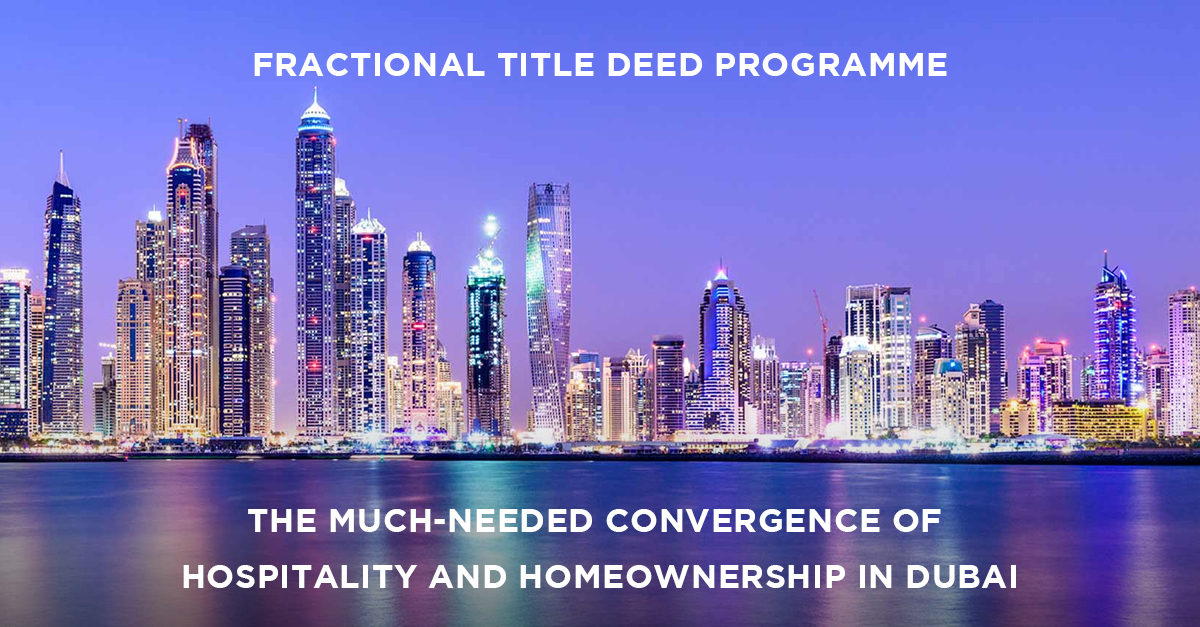Fractional title deed programme: The much-needed convergence of hospitality and homeownership in Dubai
One of the chief motivations behind UAE’s diversification from a trade-based, oil-reliant economy to an expansion in the tourism and service sectors was to build resilience against disruptions. It’s safe to say that this move has worked wonders. The Emirates have transformed into a global hub, and the epitome of a service economy. Dubai, in particular, has set exemplary standards in tourism and hospitality, registering steady growth over the years. Service industries in Dubai have remained largely unperturbed during fluctuations in the oil market and the recession of 2008.
However, the COVID-19 pandemic and its domino effect has resulted in an unprecedented downturn in service industries across the globe, including the UAE. According to JLL’s Q2, 2020 report, Dubai and Abu Dhabi hospitality markets witnessed 52% and 61% year-on-year decrease in occupancy levels, respectively(1). The average daily room rates (ADR) in Dubai decreased by 17% to USD 144, while the ADR in Abu Dhabi stood at USD 95 — a year-on-year decline of 45%.
Notwithstanding the discouraging numbers, the UAE government is pulling all stops to aid economic recovery across industries. In one such encouraging development, the Dubai Land Department (DLD) has launched a fractional title deed ownership programme, in a bid to boost investments into the regional hospitality sector.
What is fractional ownership?
By definition, fractional ownership is the combined ownership of a single asset by multiple investors. This model has been prevalent across the US and Europe, where such ownership arrangements extend to high-value tangible assets like a private plane or a yacht. In the context of real estate, the practice of fractional ownership can be traced back to the 90s, when co-ownership of holiday homes in sought-after tourist destinations came to the fore. Typically, however, such arrangements require a managing entity to administer rules and regulations, in terms of access, maintenance and transactions. This is where the DLD comes in.
“A fractional title deed pertains to an individual unit that is divided into two or four fractional shares, each with its own title deed. As is the case with other properties, these deeds can be transferred, sold or mortgaged,” a DLD representative was recently quoted in the National(2). Essentially a crowdfunding approach, fractional ownership also helps reduce the 4% transfer fee. Individual buyers are liable to pay a fraction of transfer fee, corresponding to their investment share, not on the entire property. The DLD is initially piloting the programme for one project. Based on the reception, the DLD will scale up the offering with changes, if any are required.
Fractional ownership is not to be confused with timeshare, which is “un-deeded”, meaning the participant does not truly own the property. Timesharing is characterized by limited rights over the property, without the provision for tax deductions through participation.
Implications
Fractional ownership was initially designed for holiday homes in upscale, premium destinations, for institutional investors looking for second homes. Over the years, accompanied by rising disposable income, fractional deed programmes have gained traction, particularly with the entry of middle-class buyers into the investment pool. This is to say, the programme has essentially democratized the second-homes market. These developments bode well for Dubai, which is among the most toured cities in the world, besides being a safe haven for foreign investments.
Affordability is the foremost driver of fractional ownership. That said, second homes often remain unoccupied for extended periods of time, without regular maintenance. By sharing the ownership, one can ensure hands-on control through regular occupancy and shared accountability, which helps preserve the value of property in the long term.
Additionally, fractional ownership is a much-needed convergence of hospitality and homeownership in Dubai. Such a fusion of industries was previously limited to branded residences, which tend to be on the pricier side. A similar value proposition is now accessible to investors who are wary of making large investments on total ownership, especially during the current climate of economic uncertainty. In other words, fractional ownership is about buying as much second home and comfort that one needs, without over-buying.
The fine print
However, as is the case with any asset class, fractional ownership deed programmes are not without challenges. The division of property usage could entail differences and complications, as would the splitting of overheads and maintenance costs. There are instances of overlap in usage and lack of consensus during selling of property. This perhaps explains DLD’s rationale behind slow implementation, which could in turn translate to a foolproof legal framework, to safeguard the interests of all transacting parties.
As far as Dubai is concerned, fractional ownership could find a favourable market reception. In 2017, SmartCrowd, MENA’s first financially regulated real estate investments platform (REIP), had launched a digital-powered crowdfunding model for fractional ownership in real estate. In the post-COVID scenario, the revival of the service market is a time-sensitive economic imperative. The UAE’s pragmatic decision to facilitate this new avenue for value-based offerings – under the secure framework provided by the DLD – could energize a new market segment.




